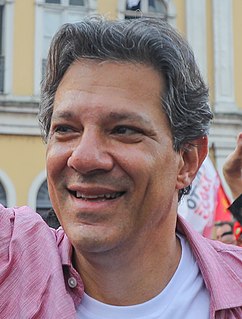A Quote by Fernando Haddad
My master's was in economics, and my Ph.D. was in philosophy, and I became a professor at USP. But after three years, I was invited to be secretary of finance for Sao Paulo mayor Marta Suplicy. They reached out to be because of my economics background.
Related Quotes
I began my career as an economics professor but became frustrated because the economic theories I taught in the classroom didn't have any meaning in the lives of poor people I saw all around me. I decided to turn away from the textbooks and discover the real-life economics of a poor person's existence.
One of the profound effects of economics in our day is that the people with the money and the power have embraced the guilt-free, external-less, everything-will-turn-out-okay-in-the-end philosophy of economics in order to justify their own evil works. And the economists, for the most part, have sucked up to that money.
I started in the law; and the study of law, when it precedes the study of economics, gives you a set of foundation principles about how human beings interact. Economics is very useful, and I studied economics in graduate school. But without understanding the social and organizational context of economics, it becomes a theory without any groundwork.
When I was mayor of New York, my views changed. I began as mayor of New York City thinking that I could reform the New York City school system. After two or three years, four years, I became an advocate of choice, of scholarships, and vouchers, and parental choice, because I thought that was the only way to really change the school system.


































